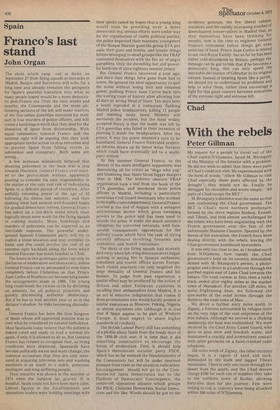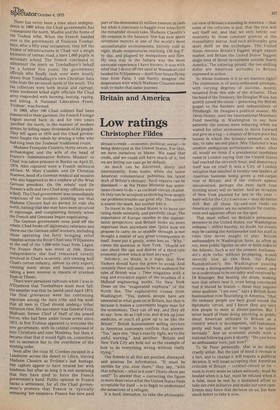Chad
With the rebels
Peter Gillman
My request for a permit to travel out of the Chad capital,N'Djamena, faced M. BitanqueY of the Ministry of the Interior with a problem. He did not wish to admit that there were parts of Chad 1 could not visit. He experimented with the form of words: "Allow Mr Gillman to visit Chad especially those parts affected by the drought"; they would not do. Finally he shrugged his shoulders and wrote simply: "All parts of Chad except the BET."
M. Bitanguey's dilemma was the same as that now confronting the Chad government. The BET is Chad's most northern prefecture, formed by the three regions Borkou, Ennedi, and Tibesti, and held almost unchallenged by the rebels who have been negotiating with the French government over the fate of the unfortunate Madame Claustre. Spurred by the threat of her execution, the French have been dealing directly with the rebels, leaving the Chad government humiliated bystanders.
It was only too clear to me, as I headed north from N'Djamena, how 'rapidly the Chad government's hold on its country diminished. Armed with M. Bitanguey's permit, a photographer and I drove in a Landrover through the parched region east of Lake Chad towards the Sahara. The road, tarmac at first, then a rocky track, ended after eighty miles at the market town of Massakori. For another 120 miles, in quite frightening heat, we followed the tyre-marks of the relief lorries through the dunes to the oasis town of Mao.
We drove a further sixty miles north to Ziguey, a fortress surrounded by refugee tents on the very edge of the vast emptiness of the true Sahara. Although we arrived in a choking sandstorm, the heat was undimished. We were received by the Chad Army Camel Guard, who gave us goat stew and brackish water, and maintained a crackly and intermittent contact with other garrisons on a hand-cranked radio telephone.
250 miles north of Ziguey, the rebel territory began. It is a region of sand and rock, dominated by the stark and jagged Tibesti mountains. There is only one route through the desert from the south, and the Chad drivers charge £100 for each ton of supplies they take to the northern town of Bardai, allowing forty-five days for the journey. Few were willing to risk it: convoys were being attacked within 200 miles of N'Djamena. There has never been a time since independence in 1960 when the Chad government has commanded the north, Muslim and the home of the Toubou tribe. When the French handed over to the government of Francois Tombalbaye, after a fifty-year occupation, they left the frailest of infrastructures in Chad: not a single kilometre of tarmac road, a bare 1,000 pupils in secondary school. The French continued to administer the north on Tombalbaye's behalf for a further five years; the government officials who finally took over were mostly drawn from Tombalbaye's own Christian Sara tribe from the savannah lands of the south. The tax collectors were both brutal and currupt; when herdsmen killed eight officials the Chad army responded with burning, looting, raping, and killing. A National Liberation Front, 'Frolinat', was formed.
In 1968, after 100 Chad soldiers had been massacred in their garrison, the French Foreign Legion moved back in, and for two years 'pacified' the north, in the manner of modern armies, by killing many thousands of its people. They left again in 1970 and the Chad government fought the rebels by arming a tribe who had long been the Toubous' traditional rivals.
Madame Francoise Claustre, thirty-seven, an archaeologist, and the wife of the head of France's 'Administrative Reform Mission' to Chad, was taken prisoner in Bardai on April 21, 1974. Also captured were a French technical advisor, M. Marc Combes, and Dr Christian Staewen, head of a German medical aid mission Who also happened to be a nephew of the West German president. (In the rebels' raid Dr Stawen's wife and two Chad army officers were killed). The Chad government was immediately suspicious of the incident, pointing out that Madame Claustre had no permit to visit the north, hinting that she may have been involved in espionage, and complaining bitterly when the French and Germans began negotiating.
The German government soon paid off the rebels; Chad broke off diplomatic relations and threw out the German relief workers, including those operating the ferry bringing relief supplies across the River Chari into N'Djamena at the end of the 1,000-mile haul from Lagos. For France there was more at risk. Since independence she had remained totally involved in Chad's economy, still owning half Chad's cotton industry, almost its only export; running many shops and businesses; and taking a keen interest in reports of uranium finds in Tibesti.
There were persistent rumours when I was in N'Djamena that Tombalbaye must soon fall; the surprise was that he lasted until April 1975. The final grievances were his continuing nepotism among the Sara tribe and his wish that all men in Chad should undergo tribal initiation rites. His successor was General Felix Malloum, former Chief of Staff of the armed forces, who had been under house arrest since 1973. At first Frolinat appeared to welcome the new government, with its cabinet composed of nine Christians and nine Moslems; but then it became clear that it would fight on, committed riot to secession but to the overthrow of the existing order.
Soon after the coup M. Combes escaped in a Landrover across the desert to Libya, leaving Madame Claustre as Frolinat's last hostage. Her captors appear to have treated her with kindness, but after so long it is not surprising that they have tried to force the French government's hand, Public opinion in France backs a settlement, for all the Chad government's protests that France is 'cynically menacing' her existence. France has now paid
part of the demanded El million ransom in cash but while it continues to haggle over what form the remainder should take, Madame Claustre's life remains in the balance. She has now spent seventeen months in one of the world's most uncomfortable environments, bitterly cold at night, shade temperatures reaching 130 deg F by day, and plagued by mosquitoes and flies. My own stay in the Sahara was the most awesome experience I have known: it was with relief that I drove off the sand at Massakori and headed for N'Djamena — itself four hours flying time from Paris. I can barely imagine the desperation with which Madame Claustre must wish to make that same journey.



































 Previous page
Previous page